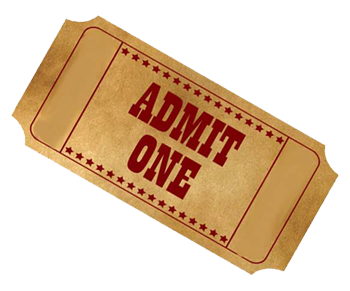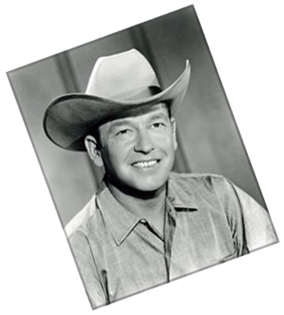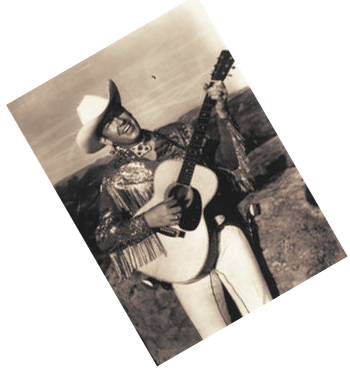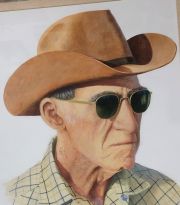

WILLCOX Cowboy Hall of Fame inductees
BERT WILSON (25)
1984 COWBOY HALL OF FAME INDUCTEE
The following biography was written at the time of Mr. Wilson's induction.
There's only one thing that led Bert Wilson to Willcox, Arizona, and that was the road. Coming from Dickens County, Texas, originally, Wilson made his way to Willcox by way of Grants County, New Mexico, Northern Arizona, the White Mountains Indian Reservation, Mesa and finally Coconino County. It only took him 28 years to make it to the place he calls "home." "I came here because of schools," Wilson said, "I had three kids in school and the closest one was 40 miles away. That's what really brought me to Willcox.
Wilson described himself as being a farmer and a rancher and, above all, a cowboy. He was only 14 when his family moved from Texas to New Mexico, and they stayed there until 1922. That was when he moved on to Northern Arizona, to Springerville and the White Mountain Indian Reservation. During the 1920's he did nothing except "just be a cowboy" and it was one of his favorite eras.
Wilson was "raised up in the life of a working cowboy" although his father was a teacher in a county school and a preacher. He liked the ranch life and even found that there's really nothing wrong in having a teacher and preacher for a father. "It never bothered me," Wilson said.
His father taught him the beauty of literature and poetry and although some may consider it a strange liking for a cowboy, Wilson never did. "I like poetry," he said. "I always have. If someone hands me a book of poetry I usually read the whole thing before I put it down." Wilson has two favorite poems, actually too many favorite ones according to him, but the two he remembers the most are "The Shooting of Dan McGrew" and "Burial of Moses". 'When you're out on the range or just alone a lot, the way a cowboy is at times, a good book of poems can mean a lot," he said.
Being out there alone is something that Wilson can relate to easily. He said that it was really lonely at times and hard work. The last time that Wilson really enjoyed "just being a cowboy" was around 1928 on the San Carlos Reservation for the Chiricahua Cattle Company. There were about 28 men with the outfit in 1928. They had 220 saddle horses and pack mules, no wagons, just pack outfits. They moved camp every three or four days and there was no grain for the horse. "The horses had to eat the grass just like the cattle," Wilson said. "Sometimes, we were out 2 or 3 months at a time."
“You eat different at some places than others,” Wilson said, "but we sure ate good at the Chiricahua. We had an awful good cook and had a variety three times a day." During hot weather Wilson said they would butcher a beef every other evening and cook it over the open fire or in Dutch ovens. They had to eat it within a day or so because that was the longest time you could keep meat during the summer months.
There have been a few changes in ranching and, in fact, Wilson says it's been almost a complete change. "We handled lots of cattle when I was working," he said, "cattle like you don't see anymore." He said there were no fences, no corrals and there were times when they branded 200 head a day or more at round-up. "Most of the young cowboys don't know what it's all about today," Wilson said, "but there are a lot of them who do. The cowboys today have to know a lot of things you didn't have to know back then. Today they have to be scientists and mechanics. We didn't have to do all that."
Wilson is proud of being a farmer, a rancher and most of all, a cowboy. He never really wanted to do anything else and was never really serious about another profession. There was a time when he was interested in blacksmithing and having a chance to learn the mechanics involved, but he was just too busy being a cowboy.
After moving to Willcox, Wilson farmed and ran a few cattle for years. He leased the farm and then started working cattle again. Wilson and his wife, Hazel, raised four children, Ellen, Rod and Art, all of Willcox, and Carol, who lives in Silver Springs, Maryland. "None of them turned out to be cowboys, at least not to make a living from it," Wilson said. "But, I brought them up to be cowboys, both the boys and the girls.
When asked about Hazel, cowboying doesn't come into the conversation. "She's just been a good wife," he said. "She's been the best I could have."
Wilson said he wouldn't have any advice for a young cowboy just starting out today. "I'd be afraid to give anybody advise because it might be wrong," he said. "We don't know the future and what's right today may not be right tomorrow." The only thing he will say is this: "Just do the thing you want to do because if you do it and do it well, it has to work. There's no way you can go wrong."








